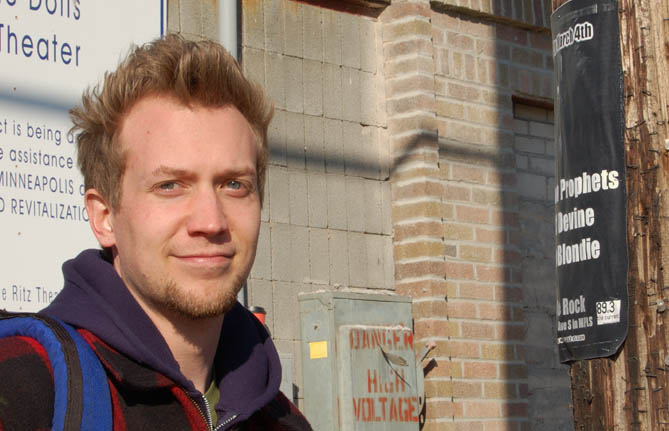Trever Nicholas Interview: Memory and Visceral Understandings
Read on for an interview with Trever Nicholas conducted at the Matchbox Coffehouse in Northeast Minneapolis by Ann Klefstad.

AK: Who are you, and where are you from?
I’m 27 years old. I was born in Ishpeming, in the Upper Peninsula of Michigan, and I went to Michigan Tech in engineering. I left after a couple of years. I loved exploring math and science and systems, but I could see the end of it. Once I discovered in art that there was no real end, that it could incorporate anything, the engineering, anything I wanted to put in it, that was what I wanted to do. So started in graphic design at the U of M and then switched to art school there.
Who were your best teachers?
My dad was an artist whether he knew it or not, he drew cartoons for the local papers, we’d go into the garage and take things apart and put them together, there was no stifling there, he left all the possibilities open. His brother was a sign painter, and the same. There was a really odd course I took in middle school, at the university, hanging out with grad students, they had us take things apart, like IBM typewriters, I made birds our of typewriter parts. I grew up thinking that everyone knew how to draw, everyone grew up curious about things, able to see things—and I found out when I went to school that wasn’t true –I don’t know why that is.
You use everyday things as materials—why?
I go back to when I was a kid—you know, anthropomorphizing clothespins and other things— I always remember being curious about the nature of things, interested to know you can look at things under a microscope, how they felt, what you could imagine about them. In school I worked in wood and metal, pretty traditional, similar in that I was playful and curious about the nature of things, but eventually I felt the ideas were traveling much too fast for me to be able to fabricate everything—
What do you do, every day, what’s a day for you?
Well, I heard something on MPR once, a guy said he was a professional observer. That’s like kind of what I do. I have my camera with me all the time, I spend time in my studio, I make connections. That’s what I’ve been doing. . . . but do you want the truth? There’s a business end of things that doesn’t have anything to do with the studio, how you make things happen for yourself. If you don’t have a knack for it, you won’t do very well. There’s lot of rejection—but that has to be ok.
What’s next?
I’m included in an exhibition at the MMAA in mid-April, a group show curated by Teresa Downing, kind of about multiplicity, there’s an interest in labor or work, and the fruits of that, then also mass production and the separation of the hand from the work. She did a studio visit a couple of weeks ago, and it was quite great.
Everything else is up in the air—a lot of possibilities but nothing final. I’m just waiting to see what envelopes show up: the SASEs with my handwriting, or the other ones, the ones you want.